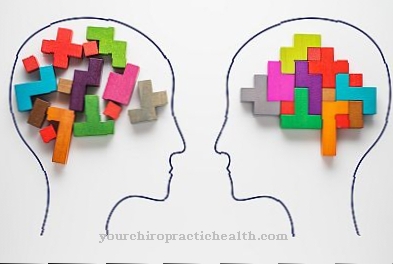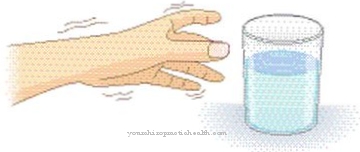Hand pain is a relatively unspecific term that only indicates the location of the event. Nothing is said about the cause of the pain. Hand pain can be attributed to a wide variety of causes using various diagnostic methods and then has to be treated accordingly.
What is hand pain?

The term hand pain is used to summarize various illnesses, signs of wear and tear and injuries in the hand area. This in turn can be ascribed to various causes.
Accidents, acute inflammations, acute or chronic overload reactions and degenerative processes can cause hand pain. The hand pain usually affects the whole hand. Usually only parts of it are affected, for example the wrists or finger joints.
However, this can lead to the entire hand being affected. This can lead to impairments in grasping or writing.
causes
The causes of hand pain can be very diverse. Degenerative processes can also trigger hand complaints, such as injuries, irritations, consequences of overuse or inflammation. Joints and hand bones can be affected by hand pain as well as individual muscles, ligaments, nerves, veins and tendons.
Hand injuries, age-related wear and tear on the joints or incorrect hand strain are the most common reasons for hand pain. Certain sports and professions put a lot of strain on the hands. Stress-related hand pain caused by computer work is differentiated from inflammation-related, rheumatic and degenerative hand pain.
Circulatory disorders, injuries and healed fractures, crushed nerves or age-related joint problems can lead to significant hand pain. Hand complaints can radiate into the arm or, conversely, shoot into the hand from the arm. Tumors, dislocations, thromboses and strains, arthritis and arthrosis, osteoporosis, rheumatism and tendinitis, gout and so-called bottleneck syndromes such as Guyon tunnel syndrome or carpal tunnel syndrome, ganglia or hardened connective tissue are known to be other causes of hand pain.
In view of this diversity, the diagnosis of hand pain must be particularly versatile and careful.
You can find your medication here
➔ Medicines for painDiseases with this symptom
- arthrosis
- rheumatism
- Carpal tunnel syndrome
- Lunate Malacia
- thrombosis
- arthritis
- osteoporosis
- Sports injuries
- Circulatory disorders
- Tendinitis
- gout
- Scaphoid fracture
course
The course of the disease in hand pain is very different due to the variety of causes. Symptoms such as stiffness and restricted mobility are usually noticed first. Sometimes, however, there is also indefinable hand pain with an unclear cause. These can focus on the whole hand, the palms, or just the joints.
Whether you always go to the doctor straight away when you have hand pain varies. Usually you will try to get relief by massaging the painful areas. If that doesn't help, you will consult an orthopedic surgeon or family doctor because of the prolonged hand pain. If the hand pain occurs as a result of an operated or conventionally treated hernia, medical follow-up treatment in a clinic is possible. Most often, physiotherapy is prescribed for further rehabilitation. With rheumatism, arthritis, osteoporosis or osteoarthritis, hand pain can also make movement and pain therapies necessary.
The hand pain disease progression can get progressively worse or occur in flares. Acute and locally limited hand pain, for example due to an inflammation of the nail bed, will disappear again after healing. Acute processes and hand complaints can, under certain circumstances, turn into chronic hand pain.
Complications
Hand pain can cause various complications, especially if it is chronic. Initially, the symptoms limit the mobility of the hand and thus lead, among other things, to muscle wasting, numbness and a decrease in the motor skills of the affected hand. Hand pain triggered by an injury or a fracture can lead to permanent deformity and nerve disorders.
In extreme cases, the affected joint stiffens and thus further restricts the mobility of the hand. In less severe cases, hand pain can lead to a slight fear of movement. Pain therapy is often the only solution here. Chronic hand pain can also lead to various side effects such as depression, anxiety and sleep disorders, which in turn lead to complications.
In addition, the treatment itself can cause complications. During the operation of the carpal tunnel syndrome, for example, temporary movement disorders can occur in the entire hand, accompanied by decalcification of the hand bones (dystrophy) and sometimes severe swelling. The wound can also become infected, which can lead to permanent hand disorders.
The side effects of the drugs range from a gastric ulcer, usually triggered by the pain reliever NSAID, to respiratory depression by opioids. It can also lead to fatigue and temporary numbness in the affected hand. Due to the large number of possible complications, early treatment of the pain is advisable.
When should you go to the doctor?
Hand pain is bothersome because it affects an area of our body that we use frequently. Our hands are in constant use and should work as usual. The type and extent of the pain determine how quickly those affected go to the doctor.
Pain in the hand can be brief but severe. Other patients complain of persistent latent pain. Those who do a lot of sport often know their body very well and know that the pain may be from the last tennis match. He will first wait to see if he will lay down on his own. If in doubt, he see his doctor and talk to him about possible causes.
Not everyone has such a good body image. In cases of persistent neuralgia, it is quite difficult for many patients to get to the bottom of the cause of the pain. A doctor's visit is therefore advisable. This also applies to chronic complaints such as gout or rheumatism. The family doctor is often the first point of contact. Depending on the situation, he will refer to specialists such as neurologists, hand surgeons and orthopedists. The general rule is: Nobody should sit out permanent pain, but rather go to the doctor.
Doctors & therapists in your area
Treatment & Therapy
The treatment of hand pain depends on the cause identified. In the case of acute hand complaints - for example due to brief overload, irritation or relieving posture - one can expect to disappear after adequate immobilization and ointment treatment.
If necessary, an ointment bandage is applied. Chronic hand complaints require treatment. The hand pain can optionally be treated with an anti-inflammatory pain reliever, a plaster cast, ointments and / or cortisone preparations. Some types of hand pain can only be resolved surgically. This applies, for example, to certain broken bones or painful bottleneck syndromes.
Joint damage can be remedied with the help of a joint mirror. For hand complaints, therapies such as physiotherapy, heat or cold treatment, massage, water or bath therapy, ultrasound treatment or electrotherapy can also be used. Orthopedic aids can also help relieve hand pain.
Outlook & forecast
The prognosis for hand pain is relatively dependent on the pain itself and the general condition of the person concerned. This means that no universal statement can be made about the course of hand pain. In most cases, however, the hand pain is an overload of the hands caused by a certain activity.
The hand pain occurs only temporarily and disappears again after a short time. The hand must be rested and not subject to physical exertion. If the hand is used despite hand pain, it can lead to inflammation and other problems in the hand, which can have more serious consequences.
If the hand pain occurs due to a chronic illness, it must definitely be treated by a doctor. This can lead to cramps and movement disorders in the hand if the hand pain is not treated properly. Treatment is usually carried out either through surgery, massages, or special therapy. Treatment with medication usually does not take place.
If the hand pain is only temporary, the pain can be numbed with the help of painkillers. However, these should not be taken over a long period of time as they cause severe damage to the stomach.
You can find your medication here
➔ Medicines for painprevention
To prevent hand pain, one should avoid any one-sided strain if possible. Hours of playing the guitar or working on the computer without breaks and occasional stretching exercises inevitably lead to hand pain. It is different with degenerative and inflammatory hand pain. Here you can usually not take preventive action. Some of these diseases are inherited.
You can do that yourself
Hand pain is relatively short-term in most people and does not need to be treated by a doctor. However, if the hand pain occurs over a long period of time and leads to very severe pain, a doctor must be consulted in any case. In this case, it could be a sprain, a fracture, or a serious illness.
Most hand pain is caused by overstraining the hand. In most cases this comes from doing sport or doing work. The hand must definitely be rested so that the muscles can relax. If the hand is not given rest, the pain usually increases.
If necessary, the patient can also take pain pills. However, these should not be taken over a long period of time as they are harmful to the stomach. Patients can also apply ointments and creams to the hand. These cool the affected area and relieve the pain. It is also advisable to stop using the hand for certain tasks and to take it easy if the pain is severe.



























